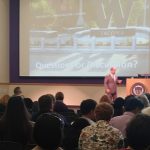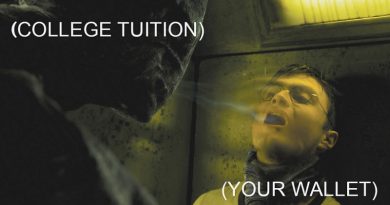Chancellor speaks on lowering budget spending
At the Chancellor’s Town Hall meeting Oct. 10 in William W. Phillip Hall, Chancellor Mark Pagano revealed UW Tacoma is struggling to stay within the university’s resource budget without raising tuition costs.
Tuition revenue has been insufficient to cover spending costs. These spending costs are allocated to receiving new laboratory equipment, partnering with a community theater, and new academic buildings. The ratio of funds available to money needed for spending is much different now than it was 10 years ago when tuition costs were higher, providing the extra money for spending.
The meeting began by focusing on the capital budget received from state funds. The budget was approved by the House and the Senate, but during the meeting, Pagano said, “it doesn’t matter if they’re approved by the House and the Senate if we don’t release the budget cause we don’t have that money.”
From 2012 to 2014, the difference between the university’s income and spending was several thousand dollars per student. When enrollment at UWT increased, there was more spending outside of the budget.
“That money was set aside and used as leverage for the Tacoma Paper and Stationery Building project and McDonald Smith Hall,” Pagano said. “And that’s how we were able to do those things.”
In 2015, when Pagano became UWT chancellor, the difference between income and spending started to decrease. According to information gathered by vice chancellor for finance and administration Tye Minckler, the tuition revenue per student was $15,282 and the operating expense per student was $14,127 in 2015.
However, in 2016, the tuition revenue per student was $15,407 and the operating expense was $14,751, making for a $499 smaller margin than the year before. Because this margin is decreasing over time, eventually the money needed for resource spending will be higher than the university’s income.
“This could happen next year or a couple years from now. It’s a little bit scary but we know about it and we’ve been planning for it, we just have to now act on it,” Pagano said.
The Executive Budget Committee, consisting of Pagano and the Finance Office, had to make difficult choices on spending priorities. Only the guaranteed amount of cushion was spent for new staff, including two faculty positions. Even though the state increased the tuition by 2.2 percent this year, it’s not enough to fund all the faculty salaries. After plugging in the numbers, the committee found that only $300,000 margin is allocated for next year’s budget.
To prepare for the budget shortage, Chancellor Pagano believes the university will have to start from scratch.
According to Pagano, Dr. Minckler has begun working on a plan to start over rather than adding additional items to the existing budget.
“This plan is even more critical than before, and we have a guiding document that helps set the budget priorities,” Pagano said. “Our growth agenda has to be closely monitored, we have to put students in where we have the resources to serve them. Likewise the new faculty and staff has to be kept at a minimum unless we have a turnover.”
Program growth, such as the multi-million dollar electrical engineering program, also requires resources.
“Luckily we got these new programs like biomedical sciences in ahead of time before the budget cuts,” Pagano said.
At the end of the meeting, attendees were given the opportunity to ask questions or state concerns.
When an audience member inquired about the process of a new budget and how the public will be engaged, Pagano answered accordingly: “The public will be engaged primarily through the Campus Budget Committee. The committee is made up of 30 people, so all the directors of each academic program, two people from the staff council, two people from the student body, and two people from the faculty assembly. They can be contacted through the campus budget website.”
As the chancellor, Pagano claims he is going to be more proactive in making sure we investigate revenue expansion and spending reductions.







